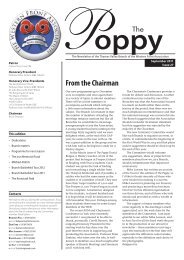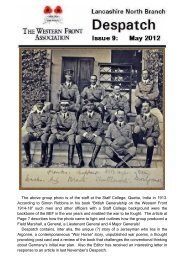The_Poppy_March_2012.pdf - The Western Front Association
The_Poppy_March_2012.pdf - The Western Front Association
The_Poppy_March_2012.pdf - The Western Front Association
You also want an ePaper? Increase the reach of your titles
YUMPU automatically turns print PDFs into web optimized ePapers that Google loves.
I forgot to mention that only two boats came down to<br />
Revel (CMBs 88 and 86). <strong>The</strong> other boat that came broke down<br />
just as she got to the flagship on her way back from Kronstadt.<br />
<strong>The</strong>n we had a bath and turned in.<br />
Next day we got our engines out and in the afternoon<br />
three of us went with some of the submarine officers for a<br />
picnic on the river. We sailed over to the river and got canoes<br />
at the mouth and went up the river to a place known to them<br />
where we had tea and buttered eggs (eggs and butter are very<br />
cheap at Revel). We started back at 6 thinking we would have<br />
plenty of time to be back by 8 when the Engr. Lt.Com (Yates)<br />
the captain of the other boat (Gordon Steele) and myself had<br />
to dine with Captain Nasmith (Martin Dunbar-Nasmith VC) but<br />
the wind dropped and we had to pull (row) all the way across<br />
arriving at 8pm exactly. It was one wild rush to get changed.<br />
We managed by being only 10 minutes late. We had a very<br />
nice dinner and a quiet evening.<br />
<strong>The</strong> next day was Sunday (24th August 1919). In the<br />
afternoon I went on the river again. That evening we were<br />
to dine at the English Civil Mission so I thought if I was back<br />
by seven it would be in plenty of time. I arrived back by five<br />
minutes to seven and was told the cars were leaving at seven.<br />
Another rush but I managed it before Capt. Nasmith, who was<br />
also dining there, was ready. We arrived at a very gorgeous flat<br />
that had once belonged to M. Girard, a Baltic Baron.<br />
<strong>The</strong>re then follows a description similar to that of the<br />
Zeebrugge reunion, describing further celebratory dinners<br />
which were mainly characterised by the vast amount of<br />
alcohol consumed ergo.<br />
coastal motor boats<br />
We started off with a sort of strawberry cup and then went<br />
in to dinner where everyone seemed to be constantly filling<br />
your glass with white vodka, red vodka, Rhine wine and<br />
Cognac. Several other N.O.s besides us, but we were given a<br />
central position. One poor grey, or nearly white, headed old<br />
RNVR Lieutenant, had to be taken home at half time, having<br />
lost all interest in proceedings. We CMB people stuck it like<br />
heroes to the last drop.<br />
<strong>The</strong>y also dined our crews in another room. <strong>The</strong>se as they<br />
collapsed were taken home in motor cars. We watched the<br />
mode of procedure of one little hero. He was carried down<br />
to the car as stiff as a poker by six very cheery Estonian sailors<br />
who, when they arrived at the car, immediately dropped him<br />
and fell on top of him.<br />
Next morning I went down to my boat and found one of<br />
the mechanics lying down. I asked him if he felt like work, he<br />
said he did. He got up, seized his cap and fled on deck and<br />
tried to be sick but failed dismally so one of the seamen, not<br />
to be outdone, immediately turned round and was violently<br />
sick over the stern.<br />
After this we lived the life of normal human beings. We<br />
stayed three weeks and returned to Biorko last Sunday (14th<br />
September).<br />
In the autumn of 1919 British forces, including<br />
the monitor HMS Erebus provided gunfire support to<br />
General Yudenich’s White Russian army in its offensive<br />
against Petrograd. <strong>The</strong> Russians tried to disrupt these<br />
bombardments by laying mines using the Orfey Class<br />
destroyers, Azard, Gavril, Konstantin and Svoboda. Frank’s<br />
CMB was involved in these actions as the CMBs were<br />
stationed so as to be able to rescue the crews of any seaplanes<br />
forced to land whilst spotting for HMS Erebus’ guns, a duty<br />
which meant that Frank, “was ten hours in my boat, soaked<br />
through almost from the start as it was rather rough. <strong>The</strong><br />
Bolshies’ shooting was very poor. Our ships were calmly at<br />
anchor bombarding while the Bolshies fired back at them.”<br />
<strong>The</strong> latter three Russian ships were sunk in a British<br />
minefield on 21st October 1919, during an attempt to defect<br />
to Estonia. <strong>The</strong> White army’s offensive failed to capture<br />
Petrograd and on 21st February 1920, the Republic of Estonia<br />
and Bolshevist Russia signed the Peace Treaty of Tartu which<br />
recognised Estonian independence. This resulted in British<br />
Naval withdrawal from the Baltic, and Frank’s return to the<br />
UK. n<br />
12


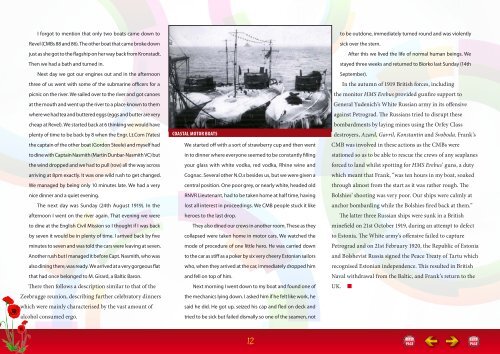
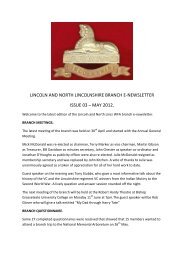
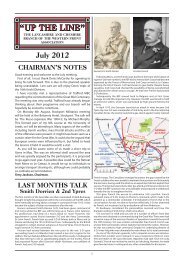

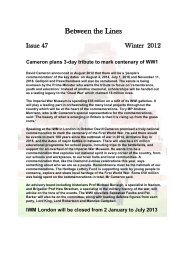

![Fromelles Australian Working List[1].pdf - The Western Front ...](https://img.yumpu.com/29972632/1/184x260/fromelles-australian-working-list1pdf-the-western-front-.jpg?quality=85)
